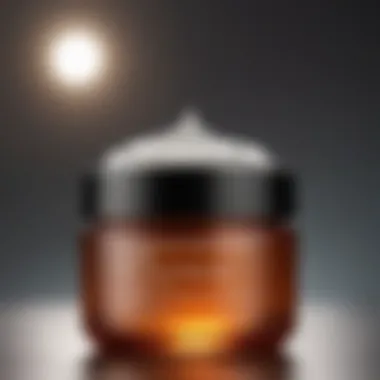Best Affordable Moisturizers for Acne-Prone Skin


Intro
Moisturizing acne-prone skin requires careful consideration of both efficacy and affordability. Many people with this skin type face the challenge of maintaining hydration without exacerbating breakouts. Understanding how to effectively incorporate moisture into an acne treatment routine is crucial for achieving this balance.
Importance of Choosing the Right Moisturizer
Selecting a suitable moisturizer can significantly impact the overall health and appearance of the skin. Key factors to consider include non-comedogenic properties, lightweight formulas, and beneficial ingredients like hyaluronic acid and glycerin. These components help maintain the skin's barrier, delivering essential hydration without clogging pores.
Audience Focus
This article aims to assist women of all ages who are seeking effective yet economical moisturizing solutions tailored specifically for acne-prone skin. By examining popular trends and the significance of specific ingredients, we will guide readers through the complexities of selecting a moisturizer that meets their needs.
Understanding Acne-Prone Skin
Understanding acne-prone skin is crucial for selecting the right moisturizer, especially for those looking to maintain skin health while being cost-conscious. Acne-prone skin typically exhibits specific characteristics and reactions to various factors, making it essential to identify these traits when choosing skincare products. The unique nature of this skin type demands adequate hydration and care without exacerbating existing issues.
Acne-prone skin may react differently to moisture compared to other skin types, thus selecting products that complement this skin type is vital. Moisturizers can support the skin's barrier, locking in essential hydration while preventing breakouts. However, the choice of ingredients and formulation style greatly matter. Understanding the skin's needs and responses to different elements allows consumers to make informed decisions, minimizing potential adverse effects on their skin's condition.
Characteristics of Acne-Prone Skin
Acne-prone skin has some distinct features. Common characteristics include:
- Oily Surface: Excess oil production can contribute to clogged pores, leading to breakouts.
- Inflammation: Often, acne-prone skin is sensitive and prone to redness or irritation.
- Pore Visibility: Enlarged pores may be more prominent, hosting bacteria and excess oil.
- Post-Inflammatory Hyperpigmentation: Dark spots may appear after acne events, requiring additional care.
Recognizing these traits enables individuals to choose moisturizers that cater specifically to their needs. For example, lightweight, oil-free formulations are often preferred, as they provide hydration without contributing to oiliness.
Common Triggers for Acne
Several factors can trigger acne flare-ups. Identifying these triggers is essential for managing acne effectively. Common triggers include:
- Hormonal Changes: Fluctuations in hormones, particularly during menstruation or adolescence, can lead to increased oil production.
- Diet: Certain foods, especially high-glycemic-index items like white bread or sugary snacks, might worsen the skin condition.
- Stress: Stress can increase cortisol levels, elevating oil production and causing breakouts.
- Cosmetic Products: Products containing heavy oils or irritants can clog pores and aggravate acne.
- Environmental Factors: Pollution and humidity can introduce unwanted substances to the skin, leading to flare-ups.
Knowing these triggers helps individuals make lifestyle changes and choose better products for their skin. This proactive approach reduces the likelihood of experiencing breakouts, reinforcing the importance of selecting the right moisturizer.
Importance of Moisturizers
Moisturizers play a vital role in maintaining healthy skin, especially for those with acne-prone complexions. It is essential to understand that even oily skin needs hydration. The misconception that moisturizing can worsen acne is prevalent but misleading. Proper hydration helps in restoring the skin barrier, which can be compromised due to various factors, such as acne treatments or environmental conditions.
Moisturizers and Skin Barrier Function
The skin barrier serves as a protective layer against external pollutants and irritants. When this barrier is compromised, the skin can become more susceptible to breakouts and inflammation. Moisturizers help strengthen this barrier by sealing in moisture and replenishing essential lipids. Without adequate moisture, the skin may produce excess oil, further exacerbating acne. Ingredients like ceramides, glycerin, and hyaluronic acid are particularly effective in fostering this barrier function.
By utilizing a good moisturizer, one can achieve balanced skin hydration. This balance is crucial for maintaining clarity. Additionally, moisturizing may improve the overall texture and appearance of the skin. To achieve the best results, incorporating a moisturizer into your daily skincare routine is essential. Look for products specifically formulated for acne-prone skin to reap the benefits.
Myths About Moisturizing Acne-Prone Skin
There are several myths surrounding moisturizer use for acne-prone skin. These misconceptions can lead to poor skincare choices and exacerbate skin issues. Some common myths include:
- If my skin is oily, I do not need moisturizer. This is incorrect. Oily skin still requires hydration.
- Using a moisturizer will clog my pores. Many moisturizers are designed to be non-comedogenic, meaning they do not cause blockages.
- Moisturizers make acne worse. The right product can help regulate oil production and improve skin health.


It is important to dispel these myths and educate oneself on how to choose effective moisturizers. By integrating a suitable and affordable option, individuals can manage acne while promoting overall skin health. Addressing these misunderstandings can empower individuals to make informed choices.
"Understanding the necessity of moisturization, particularly for acne-prone skin, can greatly influence one’s skincare journey and outcomes."
Criteria for Selecting Moisturizers
Selecting an effective moisturizer for acne-prone skin is crucial. It is not enough to pick any product off the shelf. The right choice can enhance skin clarity while preventing breakouts. An effective moisturizer should not only provide hydration but also support the skin's overall health. Understanding the criteria for selecting moisturizers can empower users to make more informed choices.
Three main considerations must guide the selection process: non-comedogenic formulations, hydrating ingredients, and the avoidance of irritants.
Non-comedogenic Formulations
Moisturizers labeled as "non-comedogenic" are specifically designed not to clog pores. This is essential for individuals with acne-prone skin, where pore blockage can lead to breakouts. These formulations typically contain lighter oils and ingredients that allow for better absorption without suffocating the skin. When shopping for moisturizers, look for terms like "oil-free" or "non-acnegenic" on the packaging. Many users find success with products containing hyaluronic acid or glycerin. These ingredients provide moisture without blockage risk, ensuring the skin remains hydrated without contributing to acne formation.
Hydrating Ingredients to Look For
Effective moisturizers need to contain ingredients that provide and retain moisture. Hyaluronic Acid is a key player here. This ingredient can hold up to 1,000 times its weight in water, making it incredibly efficient for hydration. Aloe Vera is another ingredient that is both soothing and hydrating. It also has anti-inflammatory properties, which can calm irritated skin. Other beneficial components include ceramides and squalane. These elements work to restore the skin barrier and maintain moisture levels.
When checking product labels, prioritize formulations that list these effective, hydrating ingredients near the top. The higher they are on the ingredient list, the more potent their effects will be.
Avoiding Irritants and Harsh Chemicals
For acne-prone skin, it’s vital to avoid moisturizers containing irritants. Ingredients such as alcohol, synthetic fragrances, and sulfates can exacerbate existing skin issues and trigger breakouts. Preservatives like parabens and certain types of silicones should also be regarded with caution. It is beneficial to choose products that boast minimal and simple ingredient lists. Formulations labeled as hypoallergenic can also be a safe bet, significantly reducing the chances of skin irritation.
Users should read product reviews and look for user feedback related to skin irritation. Online platforms like Reddit can provide insights from individuals with similar skin concerns. This diligence may help identify products that are well-tolerated and effective at maintaining skin health without adding risk.
"Effective moisturizing is an art of balance; finding a product that hydrates without aggravating can transform acne-prone skin."
In summary, understanding the criteria for selecting moisturizers can greatly benefit those with acne-prone skin. By focusing on non-comedogenic formulations, selecting suitable hydrating ingredients, and avoiding irritants, achieving clearer skin is possible. Making informed decisions will ultimately improve skin health and enhance overall well-being.
Affordable Moisturizers on the Market
When it comes to managing acne-prone skin, the selection of an appropriate moisturizer is essential. Finding an effective yet affordable option allows more individuals access to skincare that works without incurring significant expenses. Simply put, budget-friendly moisturizers can provide a solution to the common challenges faced by those with acne-prone skin. They do not need to be prohibitively expensive to be beneficial. Instead, they can enhance hydration, maintain skin barrier integrity, and alleviate dryness associated with acne treatments without straining financial resources.
Top Recommendations for Budget-Friendly Options
- Neutrogena Hydro Boost Water Gel
This lightweight gel provides intense hydration without clogging pores. Its key ingredient, hyaluronic acid, draws moisture to the skin effectively. Suitable for all skin types, the formulation is non-comedogenic. - CeraVe Daily Moisturizing Lotion
Enriched with ceramides and hyaluronic acid, this lotion restores and maintains the skin's natural barrier. Its gentle formula is ideal for sensitive skin, and it absorbs quickly without leaving a greasy residue. - La Roche-Posay Effaclar Mat
Specifically designed for oily and acne-prone skin, this moisturizer reduces shine while providing hydration. Its mattifying effect can help control oil throughout the day. - Simple Hydrating Light Moisturizer
This product is perfect for those on a budget, featuring a simple formula with no harsh additives. It provides hydration without irritation, making it suitable for sensitive skin.
Product Comparisons Based on Ingredients
When selecting moisturizers, the ingredients play a pivotal role in their effectiveness. Here, we will evaluate a few popular moisturizers based on their constituents:
- Hyaluronic Acid — Found in Neutrogena Hydro Boost Water Gel, it maintains moisture in the skin, which is critical for acne treatment.
- Ceramides — Present in CeraVe Daily Moisturizing Lotion, these compounds help restore the skin barrier and prevent moisture loss.
- Salicylic Acid — In some formulations, it works as an acne treatment while also providing hydration without irritation.
- Glycerin — Common in many affordable moisturizers, it hydrates the skin by drawing moisture from the environment.
These ingredients should be prioritized, as they provide hydration while safeguarding against clogging pores.
User Ratings and Efficacy
Looking at user ratings may offer insights into the actual performance of these moisturizers. Notably:


- Neutrogena Hydro Boost Water Gel has received high ratings for its lightweight texture and effectiveness in hydration. Users often commend its non-greasy finish.
- CeraVe Daily Moisturizing Lotion consistently earns praise for its ability to improve skin texture over time, with many noting a significant reduction in dry patches.
- La Roche-Posay Effaclar Mat is frequently cited for its efficacy in controlling oil, making it a favorite for those who experience breakouts and shine.
"A good moisturizer can be the difference between healthy skin and persistent acne. Choosing one that fits your skin type, especially when on a budget, should not be neglected."
Application Tips
Applying moisturizers correctly is essential, especially for those with acne-prone skin. Proper application can maximize the benefits of the product and help maintain skin clarity. Understanding the techniques for effective moisturizing can prevent issues like over-moisturizing or clogging pores, which are common concerns in this skin type.
How to Apply Moisturizers for Best Results
To achieve the best results when applying a moisturizer, the following steps are important:
- Cleanse Your Skin: Always start with clean skin. Use a gentle cleanser suited for acne-prone skin to remove dirt and excess oil. This lays a good foundation for further products.
- Pat Your Skin Dry: After cleansing, gently pat your skin dry with a clean towel. Avoid rubbing, as this could irritate the skin, especially if it's already sensitive due to acne.
- Apply on Damp Skin: It is advisable to apply moisturizers while the skin is still slightly damp. This helps to lock in moisture more effectively.
- Use the Right Amount: A pea-sized amount is usually sufficient. Over-application does not mean better hydration; it might lead to acne flare-ups.
- Gently Massage: Using upward circular motions, massage the moisturizer into your skin. This promotes better absorption and stimulates blood circulation, enhancing the health of your skin overall.
- Focus on Problem Areas: Pay attention to dry areas or spots that may feel tight. However, do this without neglecting oily areas that also need hydration.
Following these steps ensures that the moisturizer can penetrate the skin effectively without causing breakouts.
Layering Products: Order of Application
Layering skincare products correctly is crucial for an effective routine, especially when managing acne-prone skin. Here is a recommended order to obtain optimal results:
- Cleanser: Start with a gentle cleanser to remove impurities.
- Toner: Use a toner if you follow one in your routine, as it can prepare your skin for better absorption of the following products.
- Serums: If you use treatment serums that target specific skin issues, apply those next. Ensure that any active ingredients in serums do not conflict with the moisturizer.
- Moisturizer: After serums, apply your chosen moisturizer. This should be a non-comedogenic product, specifically designed for acne-prone skin.
- Sunscreen (AM Routine): In the morning, finish your routine with a layer of sunscreen if you will be exposed to sunlight. This integrates protection against UV damage.
By adhering to this order, you not only enhance the effectiveness of each product but also ensure that they work in harmony. Proper layering prevents products from interfering with each other and promotes a clear, balanced complexion.
"Effective application and layering of products are essential to managing acne-prone skin successfully."
Common Mistakes
In the journey to find the best affordable moisturizer for acne-prone skin, several common mistakes may hinder progress. Understanding these pitfalls can significantly enhance the effectiveness of your skincare routine. The right approach can improve skin clarity and overall health without overspending. Here, we will discuss two prevalent mistakes: over-moisturizing and neglecting sunscreen.
Over-Moisturizing
One significant issue faced by those with acne-prone skin is the tendency to over-moisturize. This occurs when individuals assume that applying more product will lead to better hydration. However, this is simply not correct. Over-moisturizing can result in clogged pores because products may contain oils or heavy components unsuitable for oily skin. As the skin becomes overwhelmed, this can make acne worse rather than better.
"Less is often more when it comes to moisture for acne-prone skin. Find balance rather than excess."
To avoid this mistake, always start with a small amount of moisturizer. Observe how your skin reacts before adding more product. Additionally, look for lightweight, non-comedogenic formulations which provide hydration without overwhelming the skin. Such products can deliver moisture without the risk of breakouts, allowing your skin to maintain clarity.
Neglecting Sunscreen
Another common error is neglecting the use of sunscreen. Many believe that only those with dry skin need sun protection or that it is unnecessary during cloudy days. However, this assumption puts acne-prone skin at risk of further irritation and potential long-term damage. Sunscreens protect against harmful UV rays that can aggravate existing acne and cause post-inflammatory hyperpigmentation.
It is crucial to choose a sunscreen suitable for acne-prone skin. Look for options labeled as non-comedogenic that will not clog pores. Many moisturizers designed for oily or acne-prone skin include SPF protection. This dual benefit simplifies the skincare routine by combining hydration with sun protection, which is essential for any skin type.
Expert Insights
Understanding expert insights is crucial when it comes to moisturizing acne-prone skin effectively. This discussion leverages dermatological expertise to provide readers with guidance based on scientific understanding and clinical experience. Expert opinions add reliability and depth to the article’s content, ensuring that the information presented is not only accurate but also beneficial in real-world applications. Readers gain access to strategies and recommendations that are rooted in evidence, promoting better skincare choices.
Dermatological Advice on Moisturization


When selecting a moisturizer for acne-prone skin, dermatologists emphasize the importance of non-comedogenic products. These products do not clog the pores, which is vital for preventing breakouts. Moisturizers should ideally contain ingredients like glycerin and hyaluronic acid, which attract moisture without aggravating the skin.
Additionally, gentle application techniques matter. Dermatologists recommend lightly patting the moisturizer onto the skin rather than rubbing it in. This method minimizes irritation and ensures that the active ingredients penetrate effectively. Moreover, consistency in moisturizer use helps maintain skin hydration, which can lead to an overall improvement in skin texture and clarity over time.
"Hydration helps in the skin's healing process and can even support acne treatments by keeping skin balanced." - Dermatology Expert
Holistic Approaches to Skin Health
A holistic view of skin health includes addressing both internal and external factors that impact acne. This approach considers lifestyle choices, such as diet, hydration, and stress management, alongside topical treatments. Incorporating foods rich in antioxidants, such as fruits and vegetables, can improve skin condition from the inside out.
Moreover, managing stress through practices like mindfulness or yoga can significantly affect skin health, as stress is known to trigger acne. Supplements, such as omega-3 fatty acids, may also support skin health by reducing inflammation.
In summary, expert insights focus on tailored advice that combines professional recommendations with wisdom regarding lifestyle modifications. By utilizing both dermatological advice and a holistic approach, individuals can cultivate a regimen that promotes skin clarity and overall wellness.
Customer Testimonials
Customer testimonials offer an essential glimpse into the real-world effectiveness of affordable moisturizers for acne-prone skin. These personal narratives are far more than anecdotal evidence; they carry weight in establishing trust. When potential buyers see how these products have worked for other individuals with similar skin concerns, it adds a layer of credibility that product descriptions often lack. User experiences help highlight the specific benefits and potential drawbacks of each moisturizer, guiding consumers towards informed decisions.
Testimonials can serve multiple purposes. They can illustrate how a product functions over time, its impact on skin clarity, and whether it truly delivers hydration without exacerbating acne. Additionally, reading about other users' trials and errors can be enlightening. Customers often share insights on how to integrate products into a broader skincare routine, which can be particularly relevant for those new to trying moisturizers or dealing with persistent acne.
Real User Experiences with Affordable Moisturizers
Real user experiences can vary widely but often reveal a common theme: the search for balance. Many individuals with acne-prone skin report that they initially avoided moisturizers due to the fear of breakouts. However, numerous testimonials reflect a shift when they discovered affordable options developed specifically for their skin type.
For instance, users frequently mention products like Neutrogena Hydro Boost Water Gel. Users praise its lightweight texture and hydrating formula, which features hyaluronic acid—an ingredient known for its moisture retention properties. Many say their skin feels supple and comfortable after application, without the greasy residue that often accompanies traditional creams.
Another product that garners attention is Cetaphil Daily Hydrating Lotion. Users appreciate its non-comedogenic formula, which helps them maintain hydration while ensuring their pores remain clear. Some have reported noticeable improvements in skin texture and reduced instances of irritation or breakouts.
Long-Term Usage Perspectives
Long-term usage of affordable moisturizers designed for acne-prone skin offers vital insights into their lasting effectiveness. Many users note that consistent application leads to cumulative benefits, such as enhanced skin barrier function and improved moisture retention.
The experiences shared in testimonials often highlight that patience is key. Individuals who commit to a daily moisturizing regimen often see greater overall skin health over time. A user might start experiencing improvements within weeks but may not achieve optimal results until several months have passed. This aligns with dermatologists' advice that skin improvements often require time and consistency in product application.
Moreover, long-term use helps users identify the products that best suit their skin type. Some skin types may adapt well to specific formulations, while others might require adjustments. Reading these experiences can guide new users toward what works and what to avoid, particularly when considering various ingredients known for their hydrating and non-irritating properties. Overall, testimonials provide valuable context that aids in making educated choices in the realm of affordable moisturizers.
End
The conclusion serves as a crucial component in understanding how to choose the right moisturizer for acne-prone skin. Selecting an effective moisturizer is not merely about hydration; it requires a comprehensive evaluation of the product’s ingredients, texture, and how well it works with your individual skin type.
Moisturizers can significantly impact the skin barrier, protecting it from environmental aggressors. They can also address excess oil production while ensuring that the skin is not stripped of essential moisture. Individuals with acne-prone skin can benefit from products that maintain balance without clogging pores.
Furthermore, in this article, we have underscored the importance of affordability. Many effective products are available in budget-friendly ranges, allowing for regular use without financial strain. It is essential for users to feel empowered, knowing they can find suitable options without overspending. Whether through dermatological recommendations or user testimonials, the importance of informed choices emerges clearly.
Final Thoughts on Choosing the Right Moisturizer
Choosing the right moisturizer requires critical thinking and personal assessment. Each person’s skin is unique, and what works wonders for one may not suit another. It is important to consider specific conditions, such as oily or dry patches and sensitivity levels.
When evaluating products, look for consistency in formulations and a clear list of ingredients. Non-comedogenic options contain fewer irritating substances and will reduce the likelihood of breakouts. Understanding how to read labels can provide insights into which products will yield the best results for your skin type.
Encouragement to Experiment Within Budget
Experimenting within a budget allows for a practical approach to skincare. With countless affordable options, it is possible to try different moisturizers without the pressure of high costs. Focus on those products that offer sample sizes or travel options. This strategy helps evaluate how your skin responds before committing to a full-size purchase.
Moreover, engaging with communities online, such as those on Reddit or even skincare forums on Facebook, can yield valuable recommendations that fit various budgets. You can gain insights into what others have found effective, leading to informed choices. Remember, effective skincare does not have to be expensive, but awareness and discretion are key in finding the best products suited to your needs.



